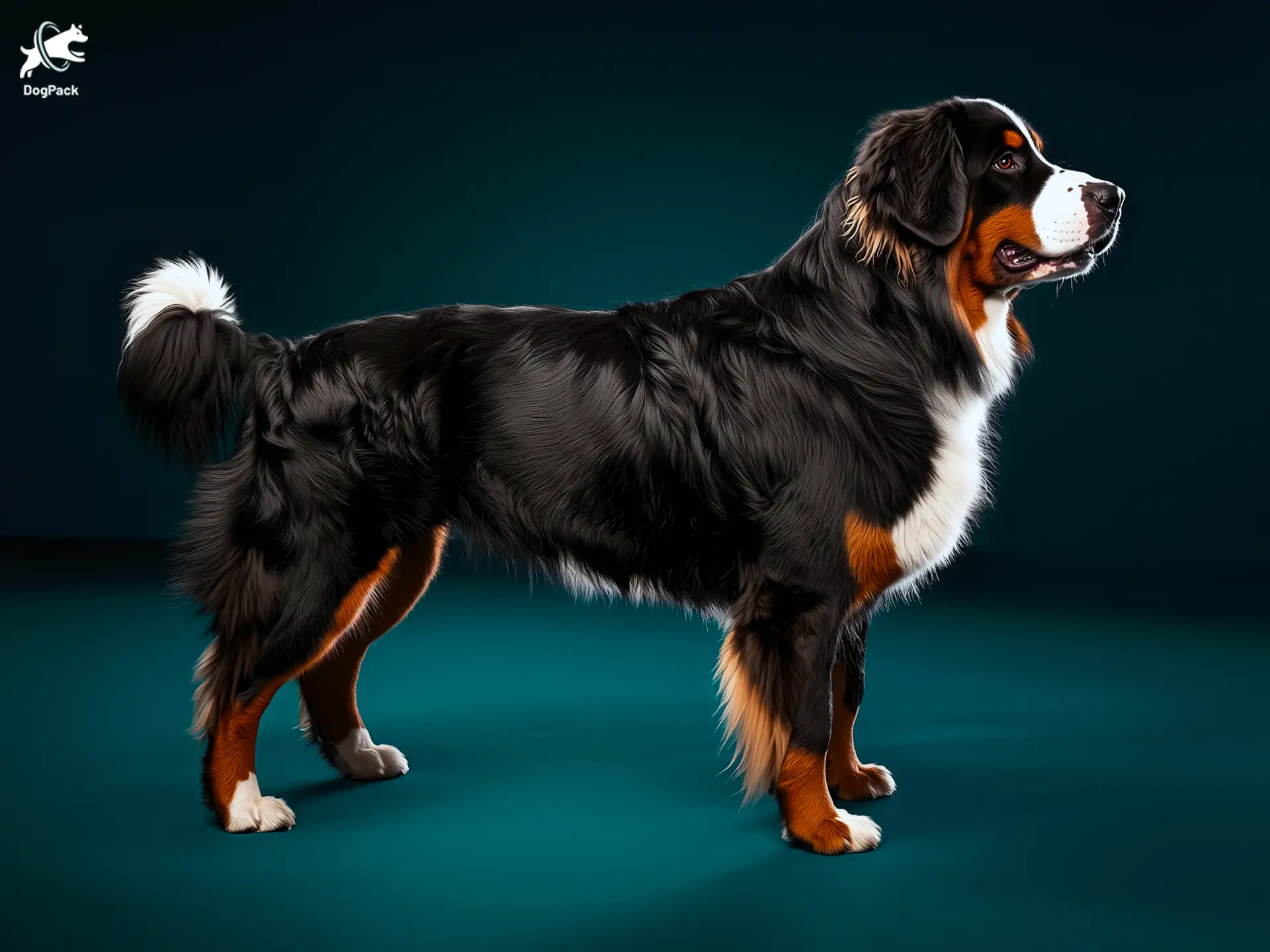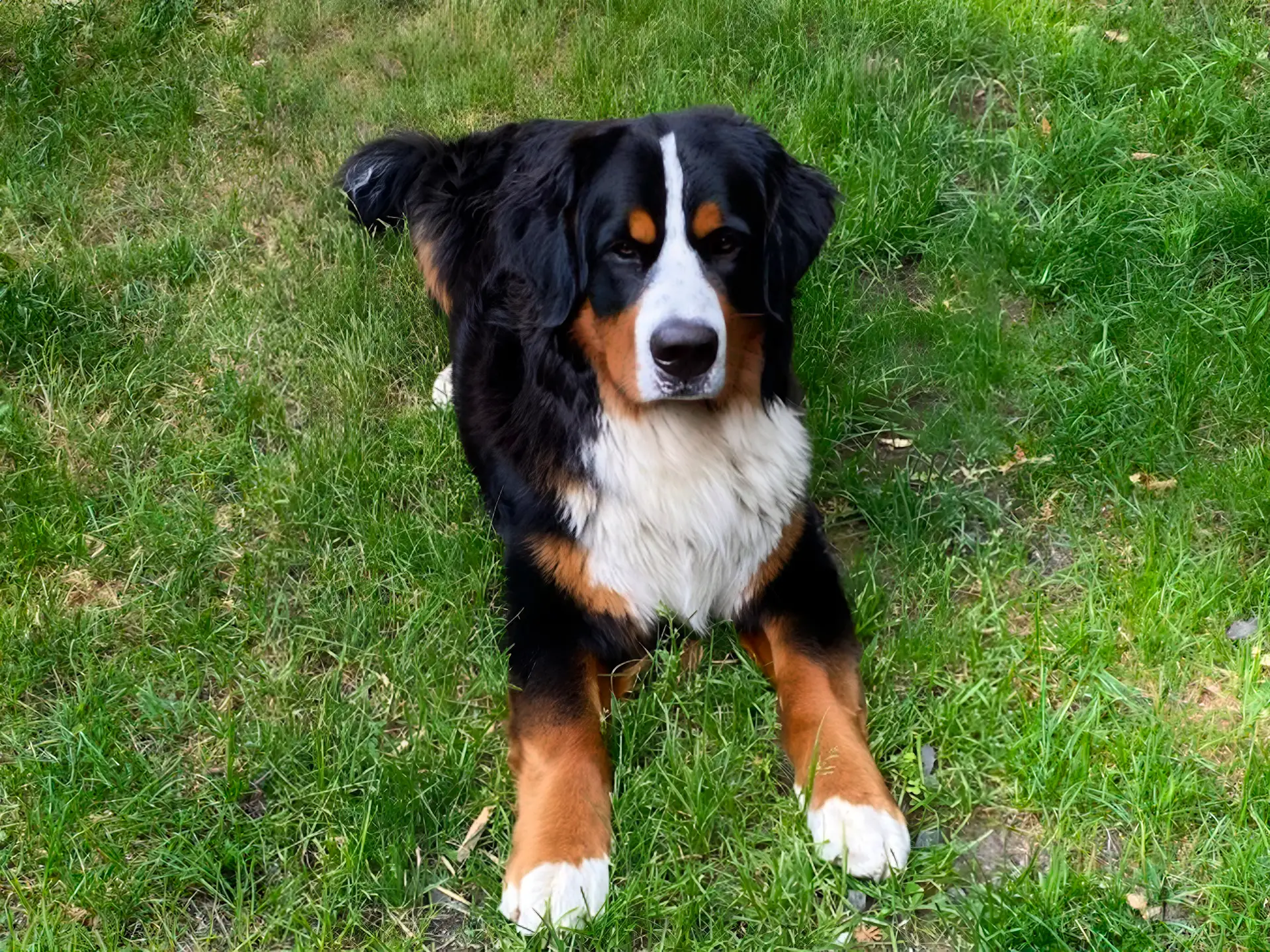Bernese Mountain Dog Breed Info & Overview
Ever thought about adding a big, fluffy teddy bear to your family? The Bernese Mountain Dog might just be your perfect match. Originating from the Swiss Alps, this breed is known for its striking tricolor coat, gentle temperament, and strong work ethic. They’re not just pretty faces; they’re loyal companions ready to join your life’s adventures.
Characteristics
Pictures
Breed History
Did you know the Bernese Mountain Dog has roots dating back over 2,000 years? These gentle giants are descendants of Roman mastiffs brought to Switzerland. They were bred to be versatile working dogs, assisting farmers by pulling carts and herding cattle in the mountainous regions.
The breed’s name “Berner Sennenhund” in German pays homage to its origins in the canton of Bern, Switzerland. “Sennen” refers to Alpine herdsmen and dairymen, highlighting the dog’s agricultural heritage. The Bernese Mountain Dog played a crucial role in Swiss farm life.
Despite their long history, the Bernese Mountain Dog nearly faced extinction in the early 20th century. Thanks to dedicated breeders and enthusiasts, the breed was revived and gained popularity worldwide. Today, they’re cherished family companions known for their work ethic and loving nature.
Temperament, Personality
If you’re looking for a loyal and affectionate companion, the Bernese Mountain Dog won’t disappoint. Known for their gentle and calm demeanor, they form strong bonds with their families. These dogs are patient and especially great with children, making them excellent family pets.
While they may be large in size, their hearts are even bigger. The Bernese Mountain Dog is typically friendly with strangers and other animals, especially when socialized early. They thrive on human interaction and enjoy being involved in family activities.
However, don’t let their easygoing nature fool you. The Bernese Mountain Dog can be protective if the need arises. They are attentive and may alert you to unfamiliar sounds or visitors, all while maintaining their composed and gentle disposition.
Physical Characteristics
The Bernese Mountain Dog is a strikingly beautiful breed with a thick, silky tricolor coat of black, white, and rust. Their expressive dark eyes and gentle facial expression can melt hearts instantly. Males typically stand 25–28 inches tall, while females are slightly smaller.
One of their most distinctive features is their bushy tail and the characteristic “Swiss cross” white markings on their chest. The Bernese Mountain Dog’s sturdy build and strong limbs were essential for their historical roles in farm work and cart pulling.
Their double coat not only adds to their majestic appearance but also provides insulation against harsh Alpine climates. Be prepared for seasonal shedding, especially during spring and fall. Regular grooming will help manage their luxurious coat.
Health Issues
Like many large breeds, the Bernese Mountain Dog is prone to certain health issues. They have a relatively short lifespan of 7–10 years, partly due to their susceptibility to cancers such as histiocytic sarcoma. Regular veterinary check-ups are essential for early detection and treatment.
Hip and elbow dysplasia are common concerns, so maintaining a healthy weight is crucial. The Bernese Mountain Dog may also experience bloat, a life-threatening condition requiring immediate attention. Discuss preventive measures with your vet.
Responsible breeders perform health screenings to reduce the risk of genetic conditions. When considering a Bernese Mountain Dog, ensure that you obtain health clearances for both parents. This proactive approach can contribute to a healthier, happier pet.
Grooming Needs
If you’re up for some quality bonding time with your dog, the Bernese Mountain Dog’s grooming needs provide just that opportunity. Their thick double coat requires brushing several times a week to prevent matting and reduce shedding around the house.
During shedding seasons, daily brushing may be necessary. A slicker brush and undercoat rake will be your best friends. The Bernese Mountain Dog also benefits from regular baths every few months or when they get particularly dirty from outdoor adventures.
Don’t forget about nail trimming, ear cleaning, and dental care. Their ears should be checked weekly for signs of infection, and teeth brushed regularly to maintain good oral health. The Bernese Mountain Dog’s grooming routine is manageable with consistency.
Exercise Requirements
While not as high-energy as some breeds, the Bernese Mountain Dog still needs regular exercise to stay happy and healthy. Aim for at least one hour of physical activity each day, which can include walks, hikes, or playtime in a securely fenced yard.
These dogs love outdoor activities, especially in cooler weather. The Bernese Mountain Dog enjoys tasks that engage both mind and body, like obedience training or cart pulling. Consider enrolling in dog sports like agility or drafting for additional stimulation. These activities can also be great for working dog breeds.
Remember that puppies should have moderated exercise to prevent joint issues. Avoid strenuous activity until the Bernese Mountain Dog reaches full maturity, usually around two years old. Always tailor exercise routines to your dog’s age and health status.
Training Tips
Training a Bernese Mountain Dog is generally a rewarding experience due to their eager-to-please nature. Positive reinforcement methods work best, using treats and praise to encourage good behavior. Early socialization is key to developing a well-rounded adult dog.
Consistency and patience are essential, as the Bernese Mountain Dog can be a bit sensitive. Harsh training methods may cause them to become shy or resistant. Keep sessions fun and engaging to maintain their interest.
Enrolling in puppy obedience classes can provide structure and social opportunities. The Bernese Mountain Dog responds well to clear commands and routine. With proper training, they can excel in various roles, from therapy work to search and rescue.
Nutrition, Diet
Feeding your Bernese Mountain Dog a balanced diet is crucial for their overall health. Due to their size, they require high-quality dog food formulated for large breeds. Protein-rich diets support muscle development, while controlled calcium levels help prevent bone disorders.
Portion control is vital to prevent obesity, which can exacerbate joint problems. Typically, an adult Bernese Mountain Dog consumes 3 to 5 cups of food per day, divided into two meals. Always adjust portions based on activity level, age, and veterinary advice.
Avoid free-feeding and monitor for signs of bloat. Feeding from elevated dishes is not recommended, as it may increase the risk of this condition. Fresh water should always be available to keep your Bernese Mountain Dog hydrated.
Adoption, Breeders
When looking to bring a Bernese Mountain Dog into your home, consider adoption from a rescue organization or shelter. The Bernese Mountain Dog Club of America Rescue can be a great resource for finding dogs in need of a loving family.
If you choose to go through a breeder, ensure they are reputable and prioritize the health of their dogs. The AmericanKennel Club’s Breeder Referral is a helpful starting point. Always ask for health clearances and visit the breeding facility if possible.
Be cautious of breeders offering unusually low prices or unwilling to provide documentation. A responsible breeder will be transparent about the Bernese Mountain Dog’s lineage and happy to answer your questions.
Family Pet?
The Bernese Mountain Dog can make a fantastic addition to the family. Their gentle and patient nature makes them especially good with children. They often form strong bonds and enjoy participating in family activities, whether it’s a hike or a cozy evening at home.
Supervision is recommended around very young children due to the breed’s large size. The Bernese Mountain Dog is generally tolerant and less likely to be reactive, but accidents can happen if play becomes too rambunctious.
They also tend to get along well with other pets, especially if raised together. Early socialization helps ensure the Bernese Mountain Dog develops good relationships with other dogs and even cats. If you’re considering other dog breeds forfamilies, this breed is definitely worth a look.
Right For You?
Before welcoming a Bernese Mountain Dog into your life, consider your lifestyle and living situation. They thrive in homes with space to roam and may not be suited for apartment living. Their size and exercise needs require a commitment to daily activity.
If you’re prepared for regular grooming and don’t mind some extra hair around the house, the Bernese Mountain Dog could be a great fit. They prefer cooler climates and can struggle in hot weather, so climate considerations are important.
Ultimately, if you’re looking for a loyal, loving companion who’s great with family members of all ages, the Bernese Mountain Dog might just be your perfect match. Their affectionate nature and willingness to please make them a joy to own.
Conclusion
In the end, the Bernese Mountain Dog offers a blend of companionship, loyalty, and beauty that’s hard to resist. Their gentle disposition and family-friendly nature make them an excellent choice for those prepared to meet their needs. From their rich history to their loving personality, they truly are a breed like no other.
Whether you’re hiking through the mountains or relaxing at home, the Bernese Mountain Dog is eager to be by your side. If you’re ready for the commitment, this gentle giant will reward you with endless affection and unforgettable memories.
FAQs
-
How much grooming does a Bernese Mountain Dog require?
While the Bernese Mountain Dog doesn’t need daily grooming, regular brushing at least 2–3 times a week is essential to manage shedding. This keeps their thick double coat in good condition, especially during shedding seasons.
-
Are Bernese Mountain Dogs prone to hip dysplasia?
Yes, Bernese Mountain Dogs are predisposed to hip dysplasia, a common joint issue. Responsible breeders often screen for this condition, and early detection can help manage it with diet, exercise, and possible veterinary intervention.
-
Do Bernese Mountain Dogs get along with small animals?
Bernese Mountain Dogs generally have a calm and gentle nature, making them good with small pets when introduced properly. Early socialization helps ensure they are comfortable around smaller animals like cats or smaller dogs.
-
How much exercise does a Bernese Mountain Dog need daily?
The Bernese Mountain Dog requires moderate exercise, with about 30 to 60 minutes of daily activity. They enjoy outdoor activities but should avoid strenuous exercise in hot weather due to their heavy coats.
-
What are the common signs of aging in Bernese Mountain Dogs?
As Bernese Mountain Dogs age, signs like reduced mobility, graying around the face, and increased susceptibility to joint issues or weight gain may appear. Regular vet visits help manage these aging-related concerns.
Breed Ratings
The Bernese Mountain Dog is smart and learns quickly, especially when training is consistent and positive.
They enjoy playtime and activities with their family, making them fun companions.
Moderate energy levels mean they appreciate daily exercise but also enjoy downtime.
Be prepared for heavy shedding, especially during seasonal coat changes.
They have a low prey drive but may still chase small animals occasionally.
Their thick coat requires regular grooming to stay in good condition.
Eager to please and intelligent, they respond well to positive training methods.
They prefer company and may become anxious if left alone too long.
Generally quiet, they bark to alert but aren’t excessive.
Moderate drooling can be expected, especially after eating or drinking.
They usually get along well with other dogs, especially when socialized early.
Prone to certain health issues, regular vet care is essential.




















